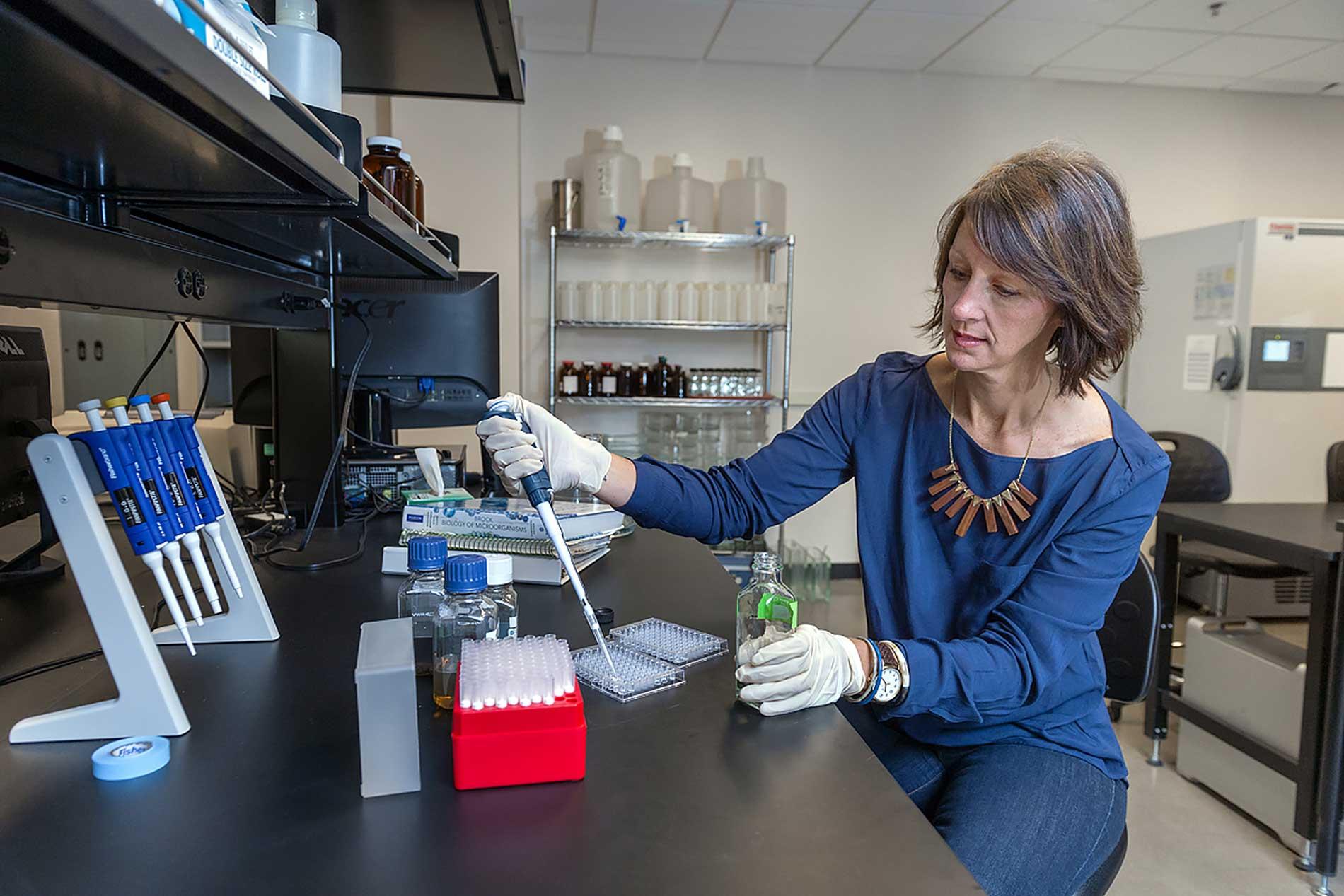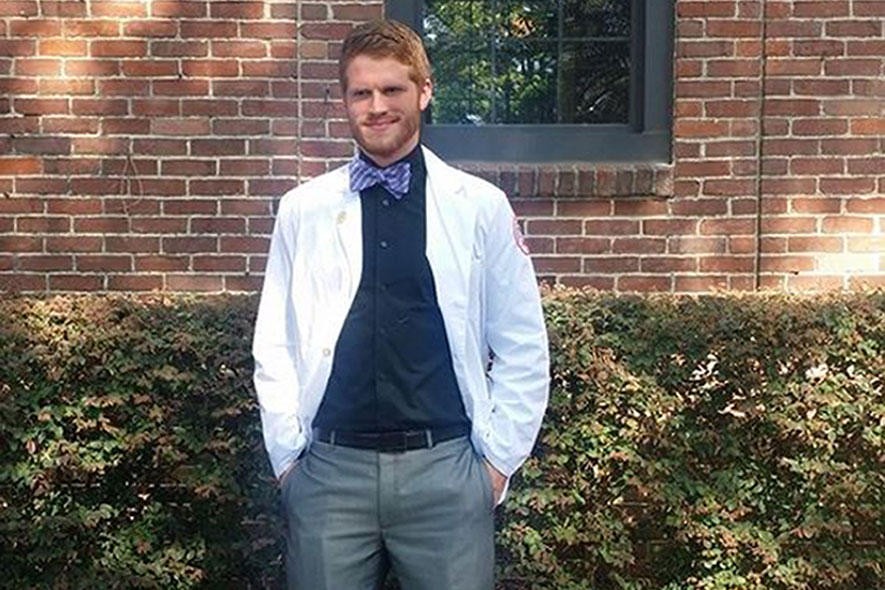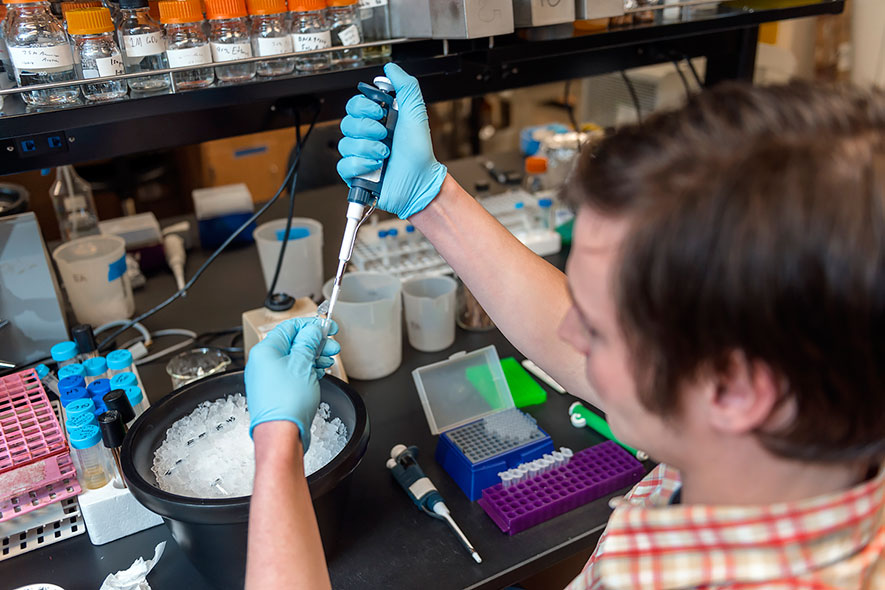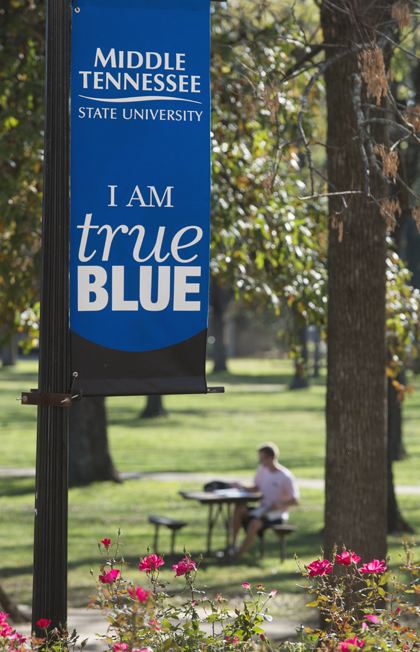
Molecular Biosciences
Advance your scientific career with a rigorous interdisciplinary program for molecular-level research expertise.
Molecular Biosciences, Ph.D.
The Doctor of Philosophy (Ph.D.) in Molecular Biosciences is an interdisciplinary program in the College of Basic and Applied Sciences that includes faculty from the departments of Biology, Chemistry, and the School of Agriculture. It is a rigorous, research-oriented course of study that aims to help students develop an understanding of cellular function and biological or biochemical mechanisms at a molecular scale.
This program focuses on the study of biological problems at the molecular level using chemical, computational, mathematical, physical, and statistical approaches as well as conventional biological approaches. The program helps each graduate develop in-depth research ability in a specific area within the sub-disciplines. Students engage in bench or field research with faculty mentors and learn to design and conduct research as independent scientists who contribute original knowledge to the discipline and complete and defend a thesis dissertation. Faculty are engaged in research areas such as biochemistry, biotechnology, cell biology, developmental biology, drug development, ecology, environmental toxicology, evolutionary biology, immunology, microbiology, molecular modeling, and structural biology. Students are required to make research presentations at national or international meetings, author journal articles, and contribute to an external grant proposal. Graduate teaching assistantships are available on a competitive basis. Research assistantships may also be available from program faculty. Only full-time students will be admitted.
News Briefs

Grad on track to research regenerative therapies
Eric Vick (2014, Ph.D., Molecular Biosciences) is pursuing his M.D. at the University of Tennessee medical school in Memphis. He will specialize in clinical pathogenesis to help develop new treatments for infectious diseases without adequate treatment regimens. Vick wants to research regenerative therapies, such as the 3D printing of organs derived from a person's own stem cells. He and Molecular Biosciences Ph.D. candidate Matthew Wright also launched a biotech company, Salomon's House, to isolate new drugs from endangered and unusual plants around the world. The Ph.D. program helped his communication skills, especially while participating in a National Science Foundation GK-12 Fellowship two years, Vick says. "I think going through the MOBI program has given me a great start as a scientist and will help to make me a better physician," he adds. Vick received the New Investigator Award at the American Society for Reproductive Immunology Annual Meeting and a Travel Award for the International Teacher-Scientist Partnership Meeting in 2013.

Ph.D. students enjoy numerous lab opportunities
Procter & Gamble awarded Amy (Shaffer) Beasley a doctoral internship during two summers to assess potential environmental risks associated with chemicals in P&G products. Jacob Crigler was voted best overall presentation at the American Society for Microbiology KY-TN Branch Meeting, a first for MTSU. He is researching bacterial strain design for biofuel production with dissertation advisor Dr. Elliot Altman. "In the two years I have been in the program, I have learned a host of molecular biology and bacterial genetics lab techniques," Crigler says. Shaffer, who finished her college degree after raising four children and running a small business, first studied with dissertation advisor Dr. Ryan Otter on an Undergraduate Research Experience grant. She planned to teach high school, but realized she was a researcher at heart. "I was able to tailor curriculum and project goals to specifically prepare for a career in industry when I graduate," she says.
News Briefs
Grad on track to research regenerative therapies

Eric Vick (2014, Ph.D., Molecular Biosciences) is pursuing his M.D. at the University of Tennessee medical school in Memphis. He will specialize in clinical pathogenesis to help develop new treatments for infectious diseases without adequate treatment regimens. Vick wants to research regenerative therapies, such as the 3D printing of organs derived from a person's own stem cells. He and Molecular Biosciences Ph.D. candidate Matthew Wright also launched a biotech company, Salomon's House, to isolate new drugs from endangered and unusual plants around the world. The Ph.D. program helped his communication skills, especially while participating in a National Science Foundation GK-12 Fellowship two years, Vick says. "I think going through the MOBI program has given me a great start as a scientist and will help to make me a better physician," he adds. Vick received the New Investigator Award at the American Society for Reproductive Immunology Annual Meeting and a Travel Award for the International Teacher-Scientist Partnership Meeting in 2013.
Ph.D. students enjoy numerous lab opportunities

Procter & Gamble awarded Amy (Shaffer) Beasley a doctoral internship during two summers to assess potential environmental risks associated with chemicals in P&G products. Jacob Crigler was voted best overall presentation at the American Society for Microbiology KY-TN Branch Meeting, a first for MTSU. He is researching bacterial strain design for biofuel production with dissertation advisor Dr. Elliot Altman. "In the two years I have been in the program, I have learned a host of molecular biology and bacterial genetics lab techniques," Crigler says. Shaffer, who finished her college degree after raising four children and running a small business, first studied with dissertation advisor Dr. Ryan Otter on an Undergraduate Research Experience grant. She planned to teach high school, but realized she was a researcher at heart. "I was able to tailor curriculum and project goals to specifically prepare for a career in industry when I graduate," she says.
Related Media

The Molecular Biosciences doctorate program aims to produce graduates who are fully prepared to pursue research careers in academia, industry, and at national labs. Mostgraduates either go on to do academic postdoctoral fellows, or are hired by industrialor medical biotechnology companies or the pharmaceutical industry.
Graduates have accepted post-doctoral fellowships at
- Vanderbilt University
- St. Jude’s Children’s Research Hospital
- Virginia Tech Center for Drug Discovery
- Emory University
- North Carolina State University
- Duke University School of Medicine
- University of Massachusetts Medical School
- Tennessee State University
- UNC Chapel Hill
- University of Missouri
Employers of MTSU alumni
- Thermo Scientific
- Eurofins PSS Insourcing Solutions
- Dow Chemical Company
- Environmental Protection Agency
- Nikon Instruments
- Canopy Biosciences
- Seres Therapeutics
- American Esoteric Laboratories
- Rocky Mountain National Labs
Graduates have also gone on to academic positions at institutions such as:
- Tennessee State University
- Coastal Carolina University
- The Webb School
- University of Kelaniya (Sri Lanka)
- King Khalid University (Saudi Arabia)



Research
Click on the faculty member's name for individual research summaries:
Dr. Frank C. Bailey, Department of Biology
Area of specialization: environmental toxicology
Research interests: aquatic toxicology, wildlife toxicology, toxicology of metals
Dr. Kevin Bicker, Department of Chemistry
Area of specialization: bioorganic chemistry; combinatorial library design and synthesis; assay development; drug development
Research interests: high-throughput screening methods; peptoid based therapeutics
Dr. Charles C. Chusuei, Department of Chemistry
Area of specialization: colloid and surface science, electron spectroscopy
Research interests: functionalization of carbon nanomaterials, materials remediation in aqueous environments
Dr. Keying Ding, Department of Chemistry
Area of specialization: bioinorganic chemistry, catalysis, polymer science, green chemistry
Research interests: small molecule activations using earth-abundant metal catalysts; homogeneous biomass conversion; design, synthesis and characterization of polymeric biomaterials.
Dr. Anthony L. Farone, Department of Biology
Area of specialization: microbial pathogenesis
Research interests: host-parasite interactions
Dr. Mary B. Farone, Department of Biology
Area of specialization: microbiology
Research interests: intracellular microorganisms, pathogenesis
Dr. Iris Gao, School of Agriculture
Area of specialization: cancer research, medicinal plants, natural products
Research interests: anti-cancer and other bioactive ingredients from medicinal plants
Dr. Scott T. Handy, Department of Chemistry
Area of specialization: organic chemistry
Research interests: organic synthesis, synthesis of bioactive compounds, cross-coupling chemistry
Dr. Christopher R. Herlihy, Department of Biology
Area of specialization: evolution, ecology, population genetics
Research interests: mating system evolution, maintenance of polymorphism
Dr. Jason R. Jessen, Department of Biology
Area of specialization: molecular, cell, and developmental biology
Research interests: regulation of planar cell polarity in migrating vertebrate cells
Dr. Jeff Leblond, Department of Biology
Area of specialization: biochemistry, microbiology
Research interests: lipid biochemistry of algae
Dr. Justin M. Miller, Department of Chemistry
Area of specialization: physical biochemistry; protease structure and function; fluorescence spectroscopy
Research interests: relationship between enzyme conformational dynamics and catalytic activity; enzyme structure-function mechanisms
Dr. David E. Nelson, Department of Biology
Area of specialization: molecular and cellular biology
Research interests: cell signaling dynamics, neurodegeneration and cancer
Dr. J. Brian Robertson, Department of Biology
Area of specialization: chronobiology, molecular genetics
Research interests: bioluminescence, microbial timekeeping, and biotechnology
Dr. Rebecca L. Seipelt, Department of Biology
Area of specialization: gene regulation, biochemistry
Research interests: gene expression (especially mRNA splicing) and function (especially enzyme biochemistry)
Dr. Jeff Walck, Department of Biology
Area of specialization: plant ecology
Research interests: seed ecology, cedar glade ecology
Dr. Donald Walker, Department of Biology
Dr. Chengshan Wang, Department of Chemistry
Area of specialization: bioanalytical and Biophysical Chemistry
Research interests: drug development for Parkinson's disease, FTIR application in biophysical chemistry, and sensor development for pollutants
Dr. April M. Weissmiller, Department of Biology
Area of specialization: genetics, genomics, molecular and cellular biology
Research interest: Basic biology of pediatric cancers
Dr. Mengliang Zhang, Department of Chemistry
Area of specialization: Analytical chemistry
Research interests: Mass spectrometry and chemometrics in forensic science, food chemistry, environmental chemistry, and metabolomics
Assistantships
Research and teaching assistantships, with stipends beginning at $20,000, are available on a competitive basis to full-time students in the MBS program. In addition to the stipend, the university also pays all tuition and most fees for assistantship holders. Non-Tennessee residents who are awarded a graduate assistantship are not required to pay out-of-state fees.
In addition to assistantships and scholarships, MTSU's Office of Financial Aid assists graduate students seeking other forms of financial support while in school.

CONTACT US

Please fill in the form below and we will contact you very soon











